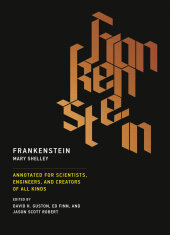 Neuerscheinungen 2017Stand: 2020-02-01 |
Schnellsuche
ISBN/Stichwort/Autor
|
Herderstraße 10
10625 Berlin
Tel.: 030 315 714 16
Fax 030 315 714 14
info@buchspektrum.de |

David H. Guston, Jason Scott Robert, Mary Wollstonecraft Shelley, Mary Wollstonecraft Shelley
(Beteiligte)
Frankenstein
Annotated for Scientists, Engineers, and Creators of All Kinds
Herausgegeben von Guston, David H.; Robert, Jason Scott
2017. 320 S. 15 ill. 227 mm
Verlag/Jahr: MIT PRESS 2017
ISBN: 0-262-53328-6 (0262533286)
Neue ISBN: 978-0-262-53328-7 (9780262533287)
Preis und Lieferzeit: Bitte klicken
Mary Shelley´s Frankenstein has endured in the popular imagination for two hundred years. Begun as a ghost story by an intellectually and socially precocious eighteen-year-old author during a cold and rainy summer on the shores of Lake Geneva, the dramatic tale of Victor Frankenstein and his stitched-together creature can been read as the ultimate parable of scientific hubris. Victor, "the modern Prometheus," tried to do what he perhaps should have left to Nature: create life. Although the novel is most often discussed in literary-historical terms - as a seminal example of romanticism or as a groundbreaking early work of science fiction - Mary Shelley was keenly aware of contemporary scientific developments and incorporated them into her story. In our era of synthetic biology, artificial intelligence, robotics, and climate engineering, this edition of Frankenstein will resonate forcefully for readers with a background or interest in science and engineering, and anyone intrigued by the fundamental questions of creativity and responsibility.
David Guston is Professor and Founding Director of the School for the Future of Innovation in Society at Arizona State University, where he also serves as Codirector of the Consortium for Science, Policy, and Outcomes. Ed Finn is Founding Director of the Center for Science and the Imagination at Arizona State University, where he is also Assistant Professor with a joint appointment in the School of Arts, Media, and Engineering and the Department of English. Jason Scott Robert is Lincoln Chair in Ethics, Associate Professor in the School of Life Sciences, and Director of the Lincoln Center for Applied Ethics at Arizona State University.


